As UNC Charlotte looks to the start of the fall semester on Sept. 7, preparations are underway to welcome back students, faculty and staff with their safety a priority.
“University employees are working virtually around the clock to be ready for students’ arrival and the first day of classes,” said John Bogdan, associate vice chancellor for Safety and Security, whose team is coordinating the University's COVID-19 response. “Balancing the excitement of a new semester with the need to protect Niner Nation from COVID-19 has required extensive planning and preparation. This includes the installation of acrylic shields and other safety devices, scheduling enhanced and additional cleanings in all buildings and developing a communications campaign designed to keep physical distancing and other healthy behavior recommendations at the top of everyone’s minds.”
Safety measures are being installed and implemented in every UNC Charlotte building. From residence halls to dining facilities to Atkins Library, plexiglass guards are being added to provide a clear barrier to mitigate COVID-19 transmission. Hand sanitizers are available and omnipresent directional signage will remind students, faculty and staff to maintain social distances and observe recommended health and safety guidelines, such as washing hands and wearing face coverings.
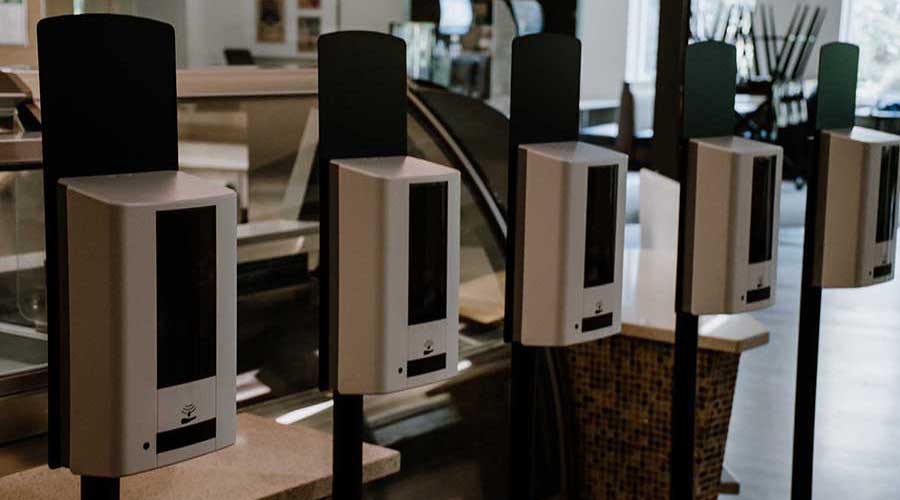
Face coverings, hand sanitizers, disinfecting wipes, plexiglass
For the fall semester, the University has ordered 600,000 disposable face coverings, 80,000 branded cloth face coverings and 40,000 hand sanitizer bottles for Welcome Back kits, 30,000 disinfecting wipe canisters, and 800 hand sanitizer stations with 16,400 refills.
In academic buildings, classrooms are being reconfigured for physical distancing with additional directional signage related to face coverings and navigating entrances/exits.
Dining safely
SoVi (South Village) and Crown Commons, along with other campus dining areas, will be open, and all dining facilities will be cleaned every 30 minutes and disinfected nightly after they have closed for the evening. Dining tables and chairs are being spaced so patrons will practice physical distancing. Also, additional plexiglass guards are being installed at every location, floor stickers will instruct guests to stand six feet apart while in line, and dining team members will wear face coverings and gloves at all times.
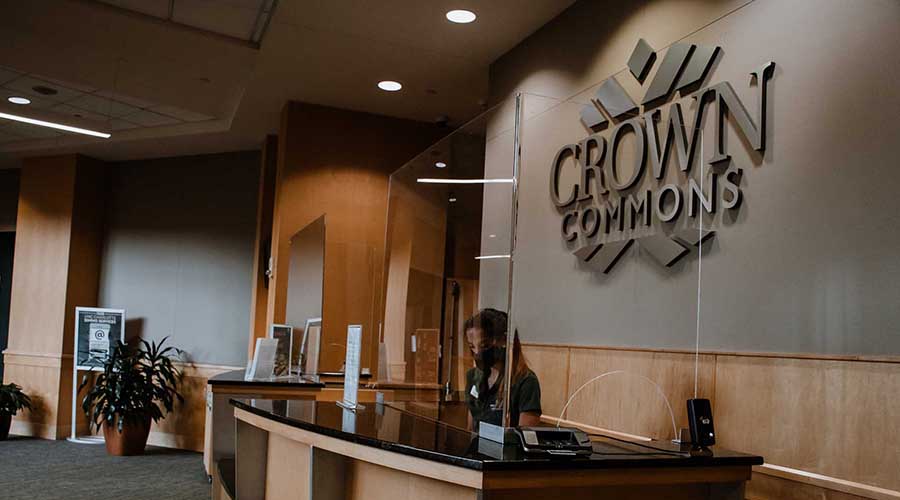
Jody Thompson, food services program manager, oversees the partnership between UNC Charlotte and Chartwells, the University’s contracted dining partner
“The Auxiliary Services and Dining Services teams have been busy modifying dining locations to allow students, faculty and staff to stay safe while dining on campus this fall,” said Thompson. “While we won't be able to see students' smiling faces as easily this year, there's nothing better than the excitement of returning to campus, seeing familiar faces and connecting with new students as they start their college experience.”
Above and beyond: electrostatic spraying and more
Maintaining a clean and safe indoor environment requires quality and effective hygiene practices. UNC Charlotte's Facilities Management (FM) will continue to clean general areas, including sanitizing bathrooms, large meeting facilities, classrooms and other general use spaces, as well as high-touch surfaces like elevator buttons and handrails.
In the era of COVID-19, cleaning procedures go beyond using an ordinary dust rag and spray bottle. The University will be using Environmental Protection Agency-registered disinfectants and microfiber cleaning cloths. And for an extra layer of protection, FM employees will use electrostatic sprayers and Adenosine Triphosphate (ATP) metering to test.
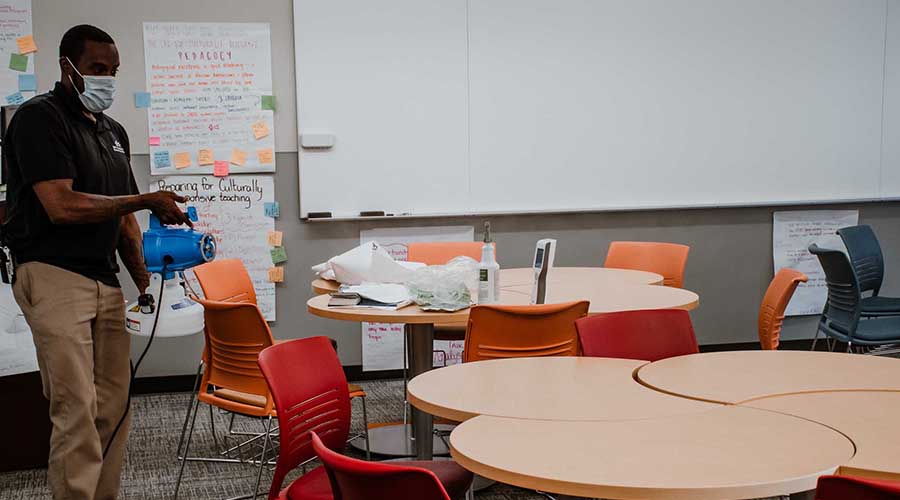
Electrostatic spraying uses a specialized solution combined with air, which is atomized by an electrode inside the sprayer. As a result, the spray contains positively charged particles that aggressively adhere to surfaces and objects. As the disinfectant leaves the machine, the added electric charge makes it static so the disinfectant will cling to all surfaces in all directions.
Larry Blomberg, Building Environmental Services (BES) manager in FM, works specifically with electrostatic misting. He noted the University has purchased 20 electrostatic sprayers for use in campus facilities.
“The advantage to this process is the disinfectant can be sprayed and be attracted to all directions of the contact surface,” said Blomberg. “All areas are evenly sprayed with an EPA-registered disinfectant.”
While electrostatic spraying isn’t new to campus, it remains a highly effective method of cleaning quickly and will be utilized more frequently to eliminate viruses on, under and around surfaces. Electrostatic misting also helps to keep FM employees safe as it is a contactless process. When additional employees come to spray the same surfaces later, they will be wiping a clean surface, keeping them safe as well.
As part of the sanitizing process, FM employees will use ATP meters, which determine cleanliness of surfaces quickly, precisely and accurately. Swabs will be taken of surfaces and inserted into the meter; readings will indicate if germ levels are within an acceptable range. Surfaces can then be disinfected and retested as needed to ensure they are safe.
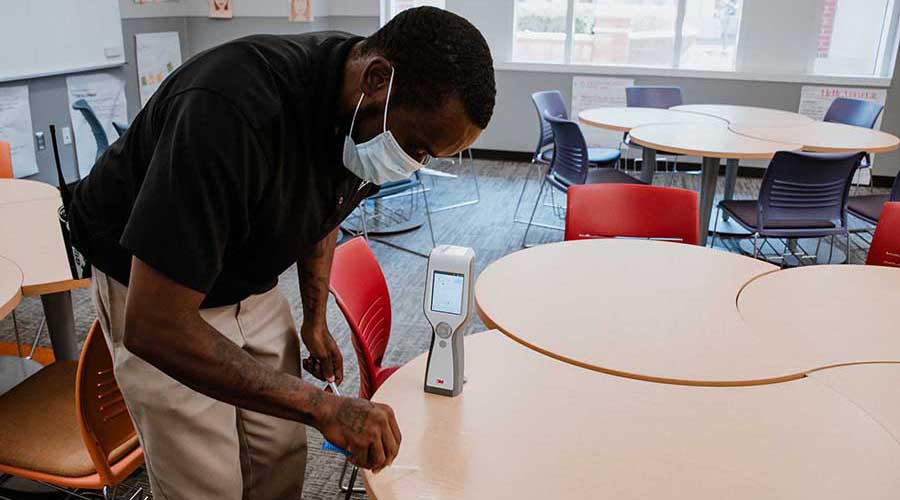
Pamela Erickson, BES office manager, has worked with her team to be prepared to use these safety procedures. She is confident in the products’ technology and the hard work of her employees.
“With the use of the electrostatic sprayer, ATP metering and knowing the level of cleaning and disinfecting that our staff does, I feel safe coming to campus, even more so than going to the grocery store,” she said.
As the University continues to prepare for a safe fall semester, members of the campus community will be reminded frequently that they, too, have a role in keeping Niner Nation healthy.
Learn more at Niner Nation Cares.
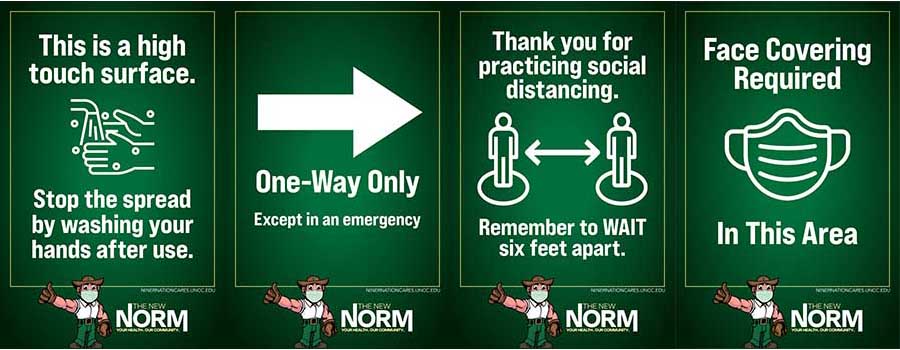
Electrostatic cleaning and testing photos are of Tasheem Hayes, BES zone supervisor, disinfecting a classroom inside the Cato College of Education